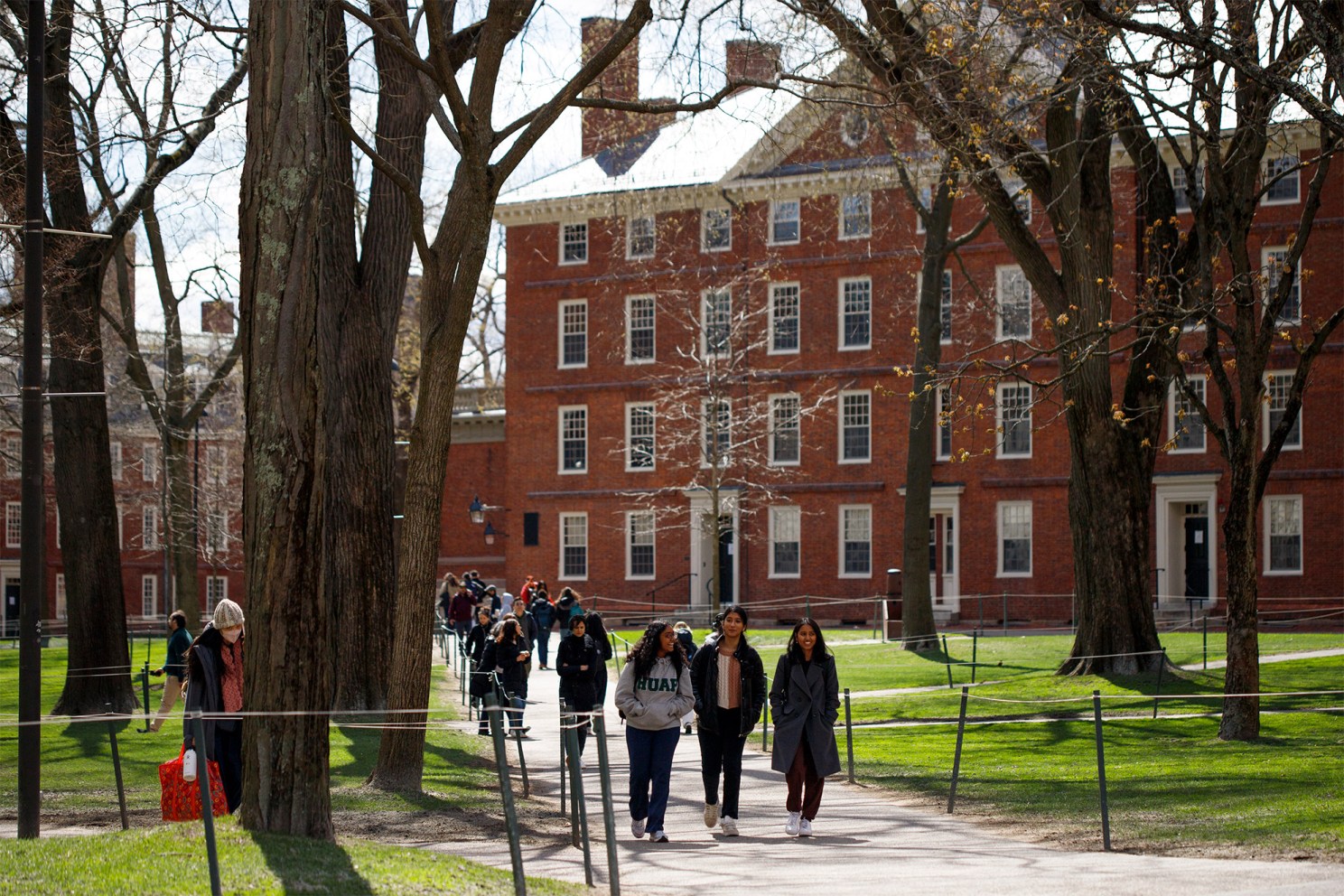University sues Trump administration over move to bar international students, scholars

Harvard Yard.
Photo by Grace DuVal
Judge grants University’s motion for temporary restraining order, blocking government’s action
A federal judge on Friday issued a temporary restraining order blocking the Trump administration from revoking Harvard’s ability to enroll international students and to sponsor international scholars.
The ruling by U.S. District Judge Allison D. Burroughs prevents the government from “implementing, instituting, maintaining, or giving effect” to the revocation. In a message to the community Friday afternoon, President Alan Garber said that a hearing has been set for Thursday to determine whether the restraining order will be extended.
Harvard’s initial complaint on the matter, filed early Friday, called the Trump order “a blatant violation of the First Amendment, the Due Process Clause, and the Administrative Procedure Act.”
Harvard’s actions were prompted by the Trump administration’s latest escalation in its dispute with the University. In a letter sent Thursday, Homeland Security Secretary Kristi Noem wrote that the University’s Student and Exchange Visitor Program certification had been revoked, effective immediately, claiming the action was a result of Harvard’s failure to adequately comply with an April 16 government request seeking records related to international students. The letter and the secretary’s accompanying press release also cited grievances against the University that were unrelated to Harvard SEVP participation, applicable regulations, or Harvard international students.
The motion for a temporary restraining order, filed shortly after the main complaint, sought an immediately halt to the government’s action, arguing that the revocation would inflict irreparable harm on the University and its students. It cites the human costs of no longer being able to sponsor or host thousands of students and scholars, whose lives and work face major disruptions. The action by the Trump administration is “undisguised retaliation,” and “quintessential arbitrary, irrational, and unilateral executive action,” the motion says. “The effects on Harvard’s students — all of its students — will be devastating. Without its international students, Harvard is not Harvard.”
In a message sent to the community Friday morning, Garber said that the University has complied with the government’s records request to the extent required by law. He condemned the Noem order and vowed to fight it.
“The revocation continues a series of government actions to retaliate against Harvard for our refusal to surrender our academic independence and to submit to the federal government’s illegal assertion of control over our curriculum, our faculty, and our student body,” he said.
“We condemn this unlawful and unwarranted action. It imperils the futures of thousands of students and scholars across Harvard and serves as a warning to countless others at colleges and universities throughout the country who have come to America to pursue their education and fulfill their dreams.”
International students at Harvard hail from more than 140 countries and make up about a quarter of its student body. In her letter, Noem said the certificate revocation means Harvard cannot host nonimmigrant international students or scholars on F- or J-visas for the 2025-26 academic year. That means current students in those visa categories have to transfer to other institutions in order to maintain their visa status, she wrote.
The order left researchers, fellows, and students shaken and angry — and worried about the implications for the country and the University. Among them was Eduardo Vasconcelos, a senior from Brazil whose family arrived in Boston for Commencement week hours before the Trump administration issued its order.
“It was hard to hold back my tears” when he heard of the Noem letter, Vasconcelos said. “The order from the administration felt like a rejection of the four years that I have spent at Harvard and an attack on the immense work that international students and scholars dedicate to the production of knowledge relevant to the United States and to the world.”
If the action were to take effect, said Vasconcelos, an honors concentrator in government and economics, the country would suffer an “immeasurable” loss of “vitality, of intellectual diversity, and of an opportunity to do good for the world.”
He added: “The federal administration is harming the capacity of America’s oldest educational institution to serve as a staircase open to all. This horrific decision limits the ability of our institution to help address the world’s most pressing challenges, which invariably requires identifying talents and voices from all over the world and bringing them to Harvard.”
Scott Delaney, an epidemiologist at the Harvard Chan School whose research has yielded insights on the health effects of air pollution and other environmental hazards, said that the action by the Trump administration threatens what should be a source of pride for the nation.
“The United States is the global leader in health science research because the best researchers from all over the world come here as students, and then they stay and build their careers,” he said.
“I personally work with students and postdocs from at least five different countries on research to improve the lives of Americans living with Alzheimer’s disease. If we kick them out just because they were born somewhere else — as the Trump administration is trying to do — then my team simply won’t produce as much high-impact research, and the United States will lose out on their insights and contributions. All of these world-class researchers will just take their talents elsewhere.”
Garber closed his message to the community by directly addressing international students and scholars: “You are our classmates and friends, our colleagues and mentors, our partners in the work of this great institution. Thanks to you, we know more and understand more, and our country and our world are more enlightened and more resilient. We will support you as we do our utmost to ensure that Harvard remains open to the world.”




